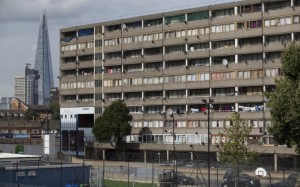
Landlords who commit housing offences must face tougher punishments, including jail sentences, the Local Government Association (LGA) has said.
The LGA, which represents councils in England and Wales, said many rogue landlords were receiving “paltry” fines for breaching housing rules.
In one case 10 people, including children, were living in a property infested with cockroaches and mice.
Currently the highest penalty for housing offences is a fine.
The LGA said a small minority of landlords were “creating misery” for tenants.
In theory fines can be unlimited, but the LGA said a lack of guidelines was forcing magistrates to take landlords’ financial circumstances into consideration during sentencing, resulting in “paltry fines”.
The average fine for housing offences is £1,500, the maximum fine is £5,000.
Gerald Vernon-Jackson, vice chairman of the LGA, told BBC 5 live: “For a landlord who owns hundreds of houses and he gets tens of thousands of pounds every month, it’s like giving a premiership footballer a speeding fine of £1,000 – it makes no difference.
“We have to have some things available to the courts to use in the most serious of circumstances.”
A landlord in Redbridge, north-east London, was fined £3,000 in 2014 for failing to rid his property of mice and cockroaches and forcing 10 tenants, including children, to share a damp and mouldy kitchen.
In Coventry six tenants were forced to live in a property for 12 months without fire alarms and a proper escape route, after which their landlord was fined £100.
Richard Lambert, the chief executive of the National Landlords’ Association, said there was “certainly a problem with enforcement of the existing legislation”.
“The only way you’re really going to have an impact on those people [rogue landlords] is to find some way of really tough sanctions,” he said.
But Mr Lambert also stressed that rogue landlords were in a minority, and not a commonplace experience.
Tenant Sally Swingewood says she has been on the receiving end of poor treatment from landlords.
She told BBC 5 live her current flat in London is better than her previous place, but she has still had to wait for over a year for urgent repairs.
She is employed and says she had no history of defaulting on rent.
She believes that bad living conditions have led to poor health – both mental and physical – for her family.
“I can’t afford to move, it’s too expensive,” she said.
“Last time I had to move I couldn’t get a landlords’ reference so no one wanted me, also I didn’t get my deposit back so I had to borrow money to get a deposit for the new flat.
“It’s not that easy moving.”
She said that in the end she had to get a guarantor and references from four different people.
“I’m in my forties and I had to get my parents to sign to say that I would pay my rent. It’s craziness,” she said.
The LGA has called for a blacklist of persistent offenders that could be accessed by local authorities.
It comes as the government considers responses to a consultation it launched on improving the private rental sector and tackling rogue landlords.
LGA housing spokesman councillor Peter Box added: “The courts need to punish rogue landlords proportionately and there should be a consistent standard when it comes to licensing.
“We know that the majority of tenants in the private rented sector are satisfied with their accommodation, but that shouldn’t distract from the fact there are far too many rogue landlords creating misery for people who often see themselves as having little choice but to put up with it.”
“Councils are doing everything they can to tackle bad practice by rogue landlords. However, they are being hamstrung by a system racked by delays, bureaucracy and feeble fines,” Mr Box added.
“Magistrates should be able to take the seriousness of the offence into consideration and jail rogue landlords who put lives at risk.”
The National Landlords’ Association welcomed plans to drive rogue landlords out of the sector but said courts needed to have the discretion to impose fines that were not beyond an offender’s ability to pay.